Showcasing Jawaharlal Nehru University at SYLFF Administrators Meeting (8-10th December 2014) at Tokyo organized by Tokyo Foundation and Nippon Foundation.
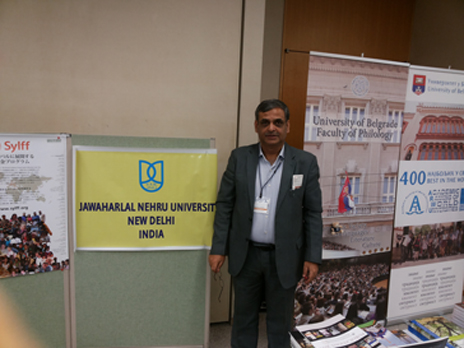
SYLFF Fellows seminar on Significance and Utility of SYLFF Fellowship on 5 Nov 2014


SYLFF Fellows of JNU with Coordinator on Nov 5, 2014
(2007-2008)
The AJSF organized two events on the 19th and 20th January 2008: (i) Seminar on Question of Globalisation, Development and Empowerment; and, (ii) Ryoichi Sasakawa Memorial Lecture delivered by Dr. Ashley Tellis, in the Committee Room, School of Languages, Literature and Culture Studies, JNU.
The Inaugural Programme commenced with Mr. N. Bijen Meetei (Officiating Principal Organizer, AJSF) welcoming the Chairperson: Prof Varyam Singh Dean, School of Languages, Literature and Cultural Studies, and Dr.S.Chandrashekaran, Coordinator Evaluation and SYLFF Administrator, as well as all the participants and guests. This was followed by Prof. Singh delivering the Inaugural Speech wherein he addressed the broad range of issues related with the chief focus of the seminar – globalization, development and empowerment. Dr. Chandrasekaran then gave a comprehensive overview of SYLFF and exhorted the SYLFF student community to develop and hone their leadership potential while at the same time engaging in meaningful academics, thereby fully justifying the purpose and vision of this prestigious Fellowship. The Inaugural Session drew to a close with Ms. Manisha Singh proposing a Vote of Thanks to Prof.Varyam Singh and Dr.Chandrasekaran. All the staff of the CE Office which helps the SYLFF Fellows round the year, and at times of organizing events such as this, was also acknowledged and thanked at this juncture.
The deliberations in the Seminar were organized under different sub-themes: Living Through the Stages of Political Economy; Globalization and Legal Challenges : Institution, State; and, Peoples' Experiences: Institution, State and Power. Under the Chairpersonship of professors and experts such as Prof. A.K.Mohanty, Prof. Gurpreet Mahajan, Dr.Anil Prasad, Dr. Prabhu Mahopatra, Dr.Rohan D'Souza, papers were presented by Dr.Bikramaditya Choudhary, Mr.Naser Ahmad, Ms. Leila Huneidti; Ms. Dana Sagha, Ms. Anindita Pujari and Mr.Krishna Kumar. The sessions were made lively by the discussants for each paper adding their valuable comments and engaging all the participants in questioning, commenting and sharing of ideas on the theme of the paper.
The sessions of the Seminar were followed by an Orientation Programme where the format was more interactive. All the SYLFF Fellows of JNU as well as those from overseas (viz. Dana, from Jordan; Laila from Oregon, USA; and, Maria from Mexico) shared how they saw their lives being affected by SYLFF, what they considered as their responsibilities as Fellows and how "fraternity" has taken on a new meaning for all of them by virtue of being SYLFF Fellows. It was interesting to realize that SYLFF Fellows from across the continents had a similar feeling of bonding with each other because of being under the aegis of a common fellowship. Following this sharing the twin objectives of the Orientation Programme was the welcome of the two new JNU SYLFF fellows - Ms.Anjana Bakshi and Mr.Biju, and also sharing with the larger JNU audience the essence and meaning of SYLFF.
The second event was the Ryoichi Sasakawa Memorial Lecture wherein Dr.Ashley Tellis delivered the address on the theme "The Ethics and Politics of Sexuality Studies and Politis in India". This session was introduced by Mr. N. Bijen Meetei who in his address shared the vision and purpose behind the Ryoichi Saskawa Young Leaders Fellowship Fund and invited Dr.Tellis to deliver the lecture commemorating Ryoichi Sasakawa - the great visionary philanthropist. This session/lecture was chaired by Dr. Bikramaditya Chaudhary. Following Dr. Tellis' felicitation he was requested to honour and bless the JNU SYLFF Fellows by giving them the mementoes.
The two-day event concluded by Ms.Manisha Singh proposing a very poignant vote of thanks to all chairpersons, discussants, paper presenters, the Tokyo and Nippon Foundations for funding and assisting the enterprise, guest SYLFF Fellows from Jordan and USA (Ms. Dana Sagha and Ms. Laila Huneidti respectively) for strengthening the bond among the SYLFF Fellows by coming to JNU, India for participating in the Seminar, as well as Ms. Maria Fernanda Vazquez Vela, currently in JNU for her fieldwork under FMP, and each person who contributed to AJSF's humble effort at promoting meaningful academic sharing and interaction. Organizing this two-day event was a very enriching exercise for each member of AJSF. We hope to be able to learn from this experience and make the forthcoming events of AJSF even more engaging and meaningful.
Orientation Programme, April 13th 2008
AJSF organized the orientation programme for 2007 batch of SYLFF fellows on April 13, 2008. Ms Sunitha B Nair in her speech explained about various components of the fellowship in detail. Further, she shared her views on SYLFF compared to other fellowships by describing her own experience in AJSF as a member as well as co-organiser in the past. Mr N Bijen Meetei inspired the new SYLFF fellows by sharing his past experience in the association. He also mentioned that the Fellows should work for the association, and that the association should do something for the society. It is important, he said, for a socially sensitive community to act on various social issues .Moreover, he shared his experiences of participating in SYLFF Regional Forums, FMP visit to University of Uppsala, and BABA Retreat at Goa. He urged the new fellows to become active in the association and thereby do justice to SYLFF. The new SYLFF fellows - Ms Anjana Bhakshi and Mr Biju introduced themselves and shared about their own research interests. All the Fellows gathered for lunch at Aravali Guest House in the campus itself.
(2006-2007)
Orientation Programme
AJSF started its second year activity by giving orientation to new SYLFF fellows on 17th January 2007. This orientation programme was aimed at welcoming the newly inducted JNU SYLFF Fellows of the 2006 batch. We assume that this programme will enable them to acquaint themselves with the association and its activities and as responsible SYLFF fellows to strengthen the network globally. The purpose of the orientation programme was to bring all the JNU SYLFF fellows together and to participate and discuss their respective researches through an interactive session that would focus exclusively on the network building within the jurisdiction of the funding foundations.
Mr. Kamei Aphun, co organizer, AJSF welcomed the chief guest and other SYLFF scholars and other administrative staff involved in SYLFF activities (informally). Dr. S. Chandrashekaran was the chief guest for the programme. Ms. Anindita Pujari gave the welcome address. She very briefly narrated about multiple programmes under SYLFF and requested participation from all SYLFF fellows for lively functioning of AJSF.
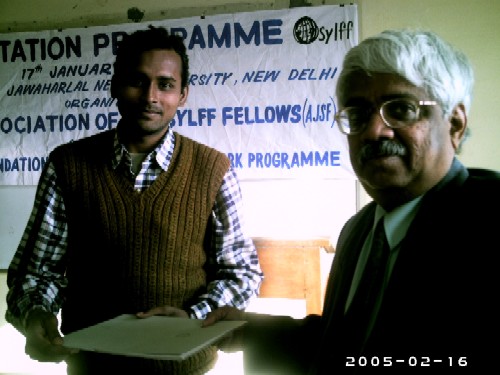
Mr. Dhiraj Kumar Nite (New SYLFF fellow) gave brief presentation of his work and introduced himself to the audience. Ms Manisha Singh another SYLFF fellow couldn't participate, as she was absent due to fieldwork. Dr Chandrashekaran gave a brief note on expectation from SYLFF fellows and reminded us about the objective of SYLFF fellowship and motivated us to work for it.
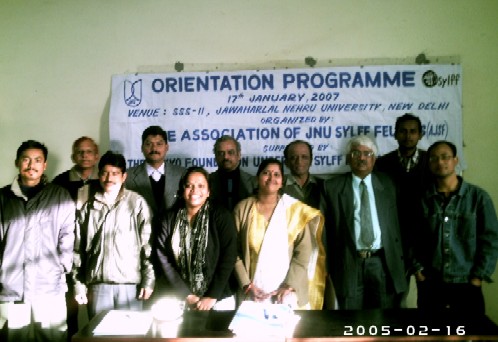
Orientation to the SYLFF scholars of 2005 batch is also given formally along with this programme though it was given earlier, informally. Mr Bijen Meetei and Ms Sunitha B Nair introduced themselves and shared their views on the fellowship and expressed their views on AJSF activities in JNU. Thereafter Mr Kamei Aphun gave Vote of thanks after a long interactive session among SYLFF fellows.
First SYLFF Lecture series:
We are proud to say that the first SYLFF lecture series by Professor Amitabh Kundu on "Good research and Bad Research: The context of policy Research" is a remarkable achievement of AJSF. Miss Anindita Pujari, the principal organizer AJSF, invited Proffesor Amitabh Kundu on behalf of Association of JNU SYLFF fellows for the first lecture of its series. The programme was sponsored by Tokyo foundation under the SYLFF network programme.
|
|
 |
|
| Prof Amitabh kundu is delivering his lecture in the first SYLFF lecture series. Ms Anindita pujari (sitting) the principal organizer | Prof Varyam Singh (First person form the right of the first row), the dean of school of languages attending the lecture |
Professor Amitabh Kundu started his lecture by giving an overview of the context in which policy research started in India. He said that the availability of fund both national and international for policy research has been the main reason behind the beginning of policy research in India in the 1970's.He argued that there are two categories of research work.One is fundamental or basic research and the other is the policy While the former aims to advance fundamental elements of the corpus of knowledge or philosophy. The policy research is directed to focus on course of realization of some given end and agenda. Thus, the scope of fundamental research is confined by the set prior-directive and terms and condition. It can question the vision behind the policy itself. While doing so he defined policy research as a research, which arises out of a policy framework, when funds for that particular research are available and the framework within which the research is carried on is limited in nature. Therefore it is different from basic research, which is not confined with regard to its framework. Further he talked about various agencies that are involved in carrying out policy research. He cautioned, though there is an impression that it is the government who designs the policy framework that is not true in many cases and the role of agencies that are designing this is therefore important. He identified government, partially government funded policy research institutes, private agencies and universities & academic institutions as the agencies involved in policy research. Among these various agencies he pointed out the significance of universities in taking the space of policy research. He concluded his lecture by suggesting academicians to move forward and occupy the scope of policy research as well along with basic research.
(2005-2006)
National Seminar
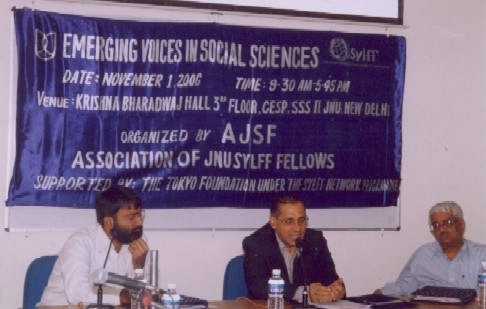
As part of its first year activity under SNP Programme, AJSF has successfully organized one-day seminar titled "Emerging voices of Social Sciences" on November 1st, 2006 at Krishna Bharadwaj Hall, CESP, SSS II, JNU. The vice chancellor of JNU Prof B B Bhattacharya inaugurated the seminar with cheering message. He reminded the SYLFF scholars of JNU that their research work should excel compared to other works, as SYLFF provides unique opportunities to tits fellows and thereby encourages students to perform superior than other students in all sense. Thereafter Dr S Chandrashekaran, SYLFF administrator of JNU gave an overview of SYLFF programme.
Presentations of SYLFF fellows followed the inaugural function. Each scholar presented papers which forms part of their Ph. D. work and it was discussed in detail both by the discussants, chair and other scholars who attended the programme. Detailed seminar schedule is attached.
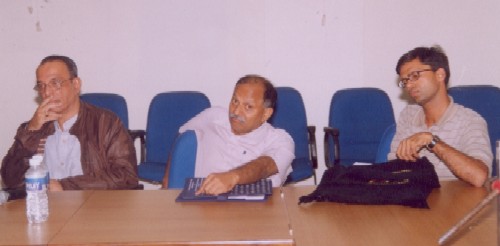
The most significant part of the programme was the Special panel discussion on SYLFF in the end of the day chaired by Prof Amitabh Kundu, Dean, and School of Social Sciences. This seminar provided AJSF a good platform to start its activities in JNU. It not only encouraged SYLFF scholars to work with more responsibility and accountability rather it made SYLFF popular in the campus. On the whole we consider this programme as a big success.

